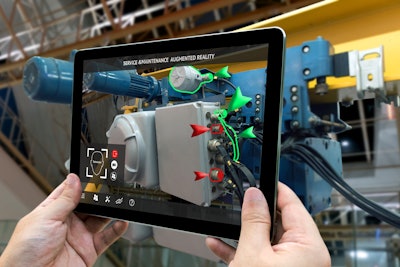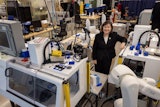
 Frank Piller
Frank PillerTechnology has gone beyond creating simple products. The last decade has brought a lot of changes coming from consumers’ demand and the products’ nature. Customers are becoming more interested in buying personalized products, customized according to their requirements. On the other hand, technology is also evolving and is putting its mark on the manufacturing industry. Each year is bringing innovation, and new technologies are used to create smart products which meet customers' expectations.
Benefits of Technology in Manufacturing
New smart technologies are changing the face of manufacturing. Nanotechnology, cloud computing, and the Internet of Things are all improving manufacturing processes and helping manufacturers save costs and increase their products' quality. Once manufacturers have experienced the game-changing benefits of technology, there is no way back. Their appetite for innovation and simplification grows every year, making them realign their businesses so that they take advantage of the latest disruptive technologies. Below you can find some of the most significant benefits that technology brings to the manufacturing industry:
- Energy efficiency – one of the biggest costs a factory has are coming from energy consumption. Becoming more energy efficient is the dream of any manufacturer. Technology makes it possible by helping businesses determine where they are losing power and developing solutions to fix those problems.
- Predictive maintenance – Internet of Things is the answer for manufacturers looking for solutions to complete maintenance proactively. The IoT sends real-time data and helps manufacturers schedule maintenance at the right time. Thus, waste coming from manufacturing is drastically reduced.
- Improved product quality – each manufacturer is continuously looking for methods to enhance their products’ quality. Technology can prevent any small errors which can then affect the quality of the products. Smart machines send immediate signals whenever something goes wrong and thus help manufacturing businesses keep their reputation and deliver products that meet the customers’ demands.
- Downtime to zero – thanks to technology and its capacity to prevent any malfunctions, downtime is reduced considerably. We all know that downtime has a lot of costs, among which the lost cost of opportunity is the greatest. Therefore, technology can help prevent any situation that may cause delays in production and lower product quality.
- Informed decisions - when using technology, there will be no single moment when managers don’t know what their machines and people are doing. Thus, based on the data received, they can switch from a reactive approach to a more proactive one. As a result, they are able to make more informed decisions and react immediately whenever an event happens.
Future of Manufacturing Technologies in 2019
“In 2019, manufacturers will have to deal with the increased customer demand for personalization, faster completion, and maximum transparency. Therefore, businesses will need to integrate their processes and choose more cost-effective solutions which will help them become more efficient and productive,” says Cory Neal, COO of The Word Point.
1. Smart machines
Manufacturers are concerned not only about creating personalized products to satisfy demand, but also having competitive prices. Therefore, each element from the production stream matters and influences their production costs. To survive in this competitive world and attract more customers, manufacturers are shifting to a product development approach centered more on software and technology. Thus, manufacturers will lower their production costs and can use the technology during various production shifts.
2. Real-time monitoring through smart technologies
Statistics show that 81 percent of manufacturers are switching or will switch to real-time monitoring as they consider that it helps their business. Real-time tracking is bringing a lot of benefits to the manufacturing of today. It improves scheduling accuracy as well as creating better levels of inventory control. Furthermore, real-time monitoring helps manufacturers improve their production plan performance. The future looks bright for real-time monitoring as it will help manufacturing businesses a lot in making inventory reconciliation more efficient. It will also improve the accuracy for tracking various measures and simplify reporting processes.
3. Evolving workforce
2019 is bringing a new and diverse generation which is enthusiastically entering the workforce. Their expectations are high, and so are their demands. In addition, working for a manufacturing business is not on their priorities list. Therefore, manufacturers will have to deal with a skills gap in 2019. It will become difficult for them to convince the new generation to accept a position in their company and fill their “thirst” of innovation and growth. Manufacturers will have to find exciting ways to attract young and tech-savvy workers for a career in manufacturing. On the other hand, as recruiting new employees is challenging, business owners should also switch their attention to the existing employees as well. For example, they can retrain old employees and keep them informed about the latest technology updates introduced in the production flow. This is how you show recognition to experienced employees and make them loyal to the business many years from now. Furthermore, foreign labor can also be a solution. International teams can be an excellent catalyzer for existing employees as they can share their experiences and boost the confidence for the older workers.
4. Industrial robots
Technology evolution is becoming too evident for small and medium manufacturing businesses to ignore it. Robots were created with incredible skills like increasing dexterity or machine vision. The ways a robot can be used are limitless. However, even though artificial intelligence is evolving a lot, humans are still relevant. Therefore, one of the challenges manufacturers will have to face in 2019 is to find the right balance between robots and humans. In comparison to industrial robots, 2019 is going to be the year which brings collaborative robots in the manufacturing world. They should be seen as an extra pair of hands, increasing the capabilities of existing workers and reaching zero errors in the manufacturing process. We are experiencing the robot revolution, and we should take maximum advantage of it. Collaborative robots can be programmed via hardware and software to do an amazingly high and diverse number of jobs. Manufacturing can finally rely on a mix of human and robotic labor which will increase productivity and ROI.
5. Analytics and business intelligence
There’s no surprise that analytics and business intelligence will continue to penetrate the manufacturing industry. 2019 is going to be the year that is going to cement their importance for manufacturing, helping businesses increase their production capacity and create a better resource planning. Thanks to business intelligence, manufacturing businesses can easily anticipate problem areas and collect relevant data for business growth. Moreover, analytics and business intelligence provide more accurate financial visibility into shop floor production.
Manufacturing business owners are constantly seeking for methods of staying ahead of the competition and expanding the list of clients. Technology plays a very important role, as it helps them remain efficient and meet their customers' demands. What is more, thanks to technology breakthroughs they are able to reduce costs and improve their profitability. As we already showed above, 2019 is going to be an interesting year, coming with various trends which will help manufacturers keep their clients happy and excited.
Professor Frank Piller writes on behalf of The Leadership Network.























